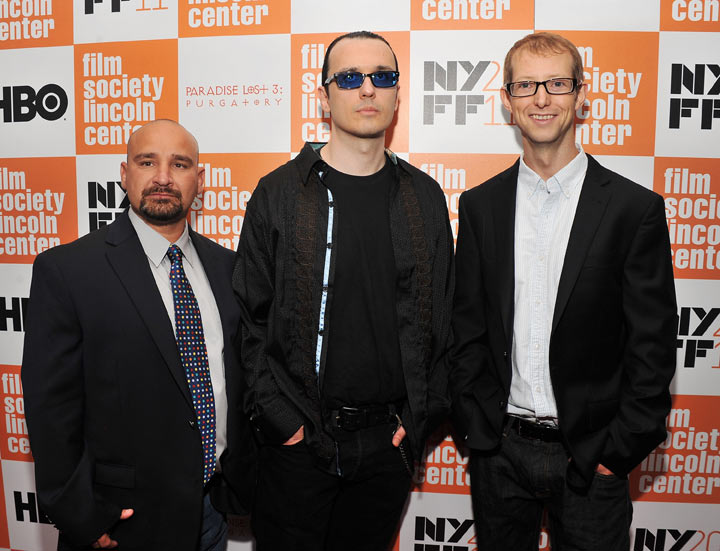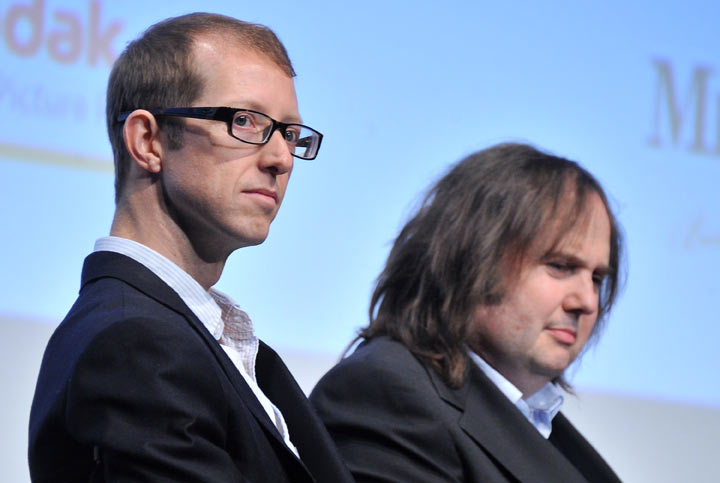Watch above: Jason Baldwin, convicted in 1994 of the murders of three eight-year-old boys in Arkansas, visited Global’s The Morning Show before a speech at the Association in Defence of the Wrongly Convicted.

TORONTO – “My first day in prison, people were literally trying to kill me, because they thought I was guilty. By the end, they knew I was innocent, and all those curses and beatings turned into prayers and hugs.”
Jason Baldwin speaks about his 18 years and 78 days in jail with a calm, even voice, expressing gratitude for those who believed in his innocence all along.
Baldwin’s first day in prison was in 1994, after he was convicted—along with friend Damien Echols and schoolmate Jessie Misskelley Jr.—of murdering three eight-year-old boys in West Memphis, Arkansas. Baldwin had just finished tenth grade.
The three young victims were Steve Branch, Michael Moore and Christopher Byers, who went missing on May 5, 1993. The next day, the boys were found in a creek, naked and “hogtied” with hands bound to their feet. The autopsies said Byers died of multiple injuries; Branch and Moore of multiple injuries and drowning.
Baldwin maintained his innocence in police interviews, and said he tried to be patient.
“They had this theory and this story that they would rather believe than the truth,” he told Global’s The Morning Show.
Baldwin said police took his fingerprints, hand prints, footprints, hair, blood and saliva samples when he was charged.
“That let me know that they had something to compare it to, so my hope was, in their evidence, that they would prove my innocence,” he said.
But that didn’t happen.
Instead, he was told by police that a “friend” of his said the accused—dubbed the West Memphis Three—had committed the murders. Baldwin refused to believe them.
“But I didn’t understand at the time that they had bullied this person—who was Jessie—into basically crying uncle,” said Baldwin. “He would’ve told them he was an astronaut and he was on the moon last night by the end of their interrogation if that’s what they were seeking.”
Misskelley was questioned by police for about 12 hours on June 3, 1993. His IQ was reported to be 72, which placed him at a borderline intellectual functioning range; a cognitive impairment.
“They laid out the photographs and they went over each injury one by one to create a believable story. But the officers didn’t know the mechanism of injury, and neither did Jessie,” said Baldwin.
“They were just trying to make up a story that people would believe in order to get a conviction. And that’s what they did.”
Added to the prosecution’s case was testimony from Vicki Hutcheson, who claimed that Echols had invited her to a Wiccan meeting. This was meant to strengthen the argument that Echols and the other two teens had killed the young boys as part of a satanic ritual. Years later, Hutcheson recanted her testimony, claiming police had threatened her.
“I was just a big liar,” she said in 2012’s documentary West of Memphis. “I really was just a big liar.”
The police department also bungled the retrieval of possible evidence from Bojangles, a local restaurant. A possible suspect was introduced in Misskelley’s trial, after a report near the crime scene of a man who seemed disoriented and was bleeding in the ladies bathroom. Police didn’t enter the restaurant to check the blood until the next day, when the man was long gone.
Baldwin credits HBO Documentary Films president Sheila Nevins and filmmakers Joe Berlinger and Bruce Sinofsky with showing the world “the kangaroo court and how we were set up.”
But the families of the boys may never have peace, because of how the case was settled in court.
In 2007, DNA from the crime scene was tested; none was found to match any of the West Memphis Three. One piece of hair “not inconsistent with” Branch’s stepfather, Terry Hobbs, was found tied into knots used to bind one of the 8-year-old boys, prompting Hobbs’ ex-wife Pam to say he “possibly” had something to do with the murders.
A July 2007 statement from prosecuting attorneys said the state “stands behind its convictions of Echols and his codefendants,” but in November 2010, the Arkansas Supreme Court ordered the reconsideration of the DNA evidence.
On Aug. 19, 2011, Baldwin, Echols and Misskelley were all released from prison after submitting an Alford plea. This strategy allows for a “no contest” plea while the three men maintained their innocence.
The state of Arkansas didn’t want to reopen the case in court, because it was afraid of the cost should the three men be able to prove their innocence with the help of the DNA evidence not available in 1993.
“The prosecuting attorney put the price on it – he said it would cost the taxpayers $60 million.”
“And the idea of the Alford plea was to save them that burden. And I can understand wanting to save them that burden, but you don’t do it at the cost of justice,” said Baldwin.
He was against entering the plea that compromised his innocence, but said he did it to save Echol’s life—both from the lethal injection he was facing, and from the 23 hours per day of lockdown at the high security Varner Unit prison.
“My life is so much different than Damien’s. I wasn’t on death row, I had opportunities to be around people and to grow…I could have potentially stayed there another two years,” said Baldwin. “Did I want to be there? No. Did I deserve to be there? No. But I could have.
“But Damien couldn’t have. His health was failing terribly.”
Baldwin said it seems like the legal system is telling the families of the victims that they don’t matter, and that justice doesn’t matter.
“I don’t want the money; I don’t need the soothing.”
“I just want my life, my name cleared,” he said.
Baldwin will be a keynote speaker at the Association in Defence of the Wrongly Convicted (AIDWYC) on Saturday in Toronto.
Canadian director Atom Egoyan’s dramatized feature film of the case, called Devil’s Knot, is slated for a Jan. 2014 release. The movie follows 2012’s documentary West of Memphis (coproduced by Echols) and three Paradise Lost documentary films spanning from 1996-2011, which initially earned the public’s attention.



Comments